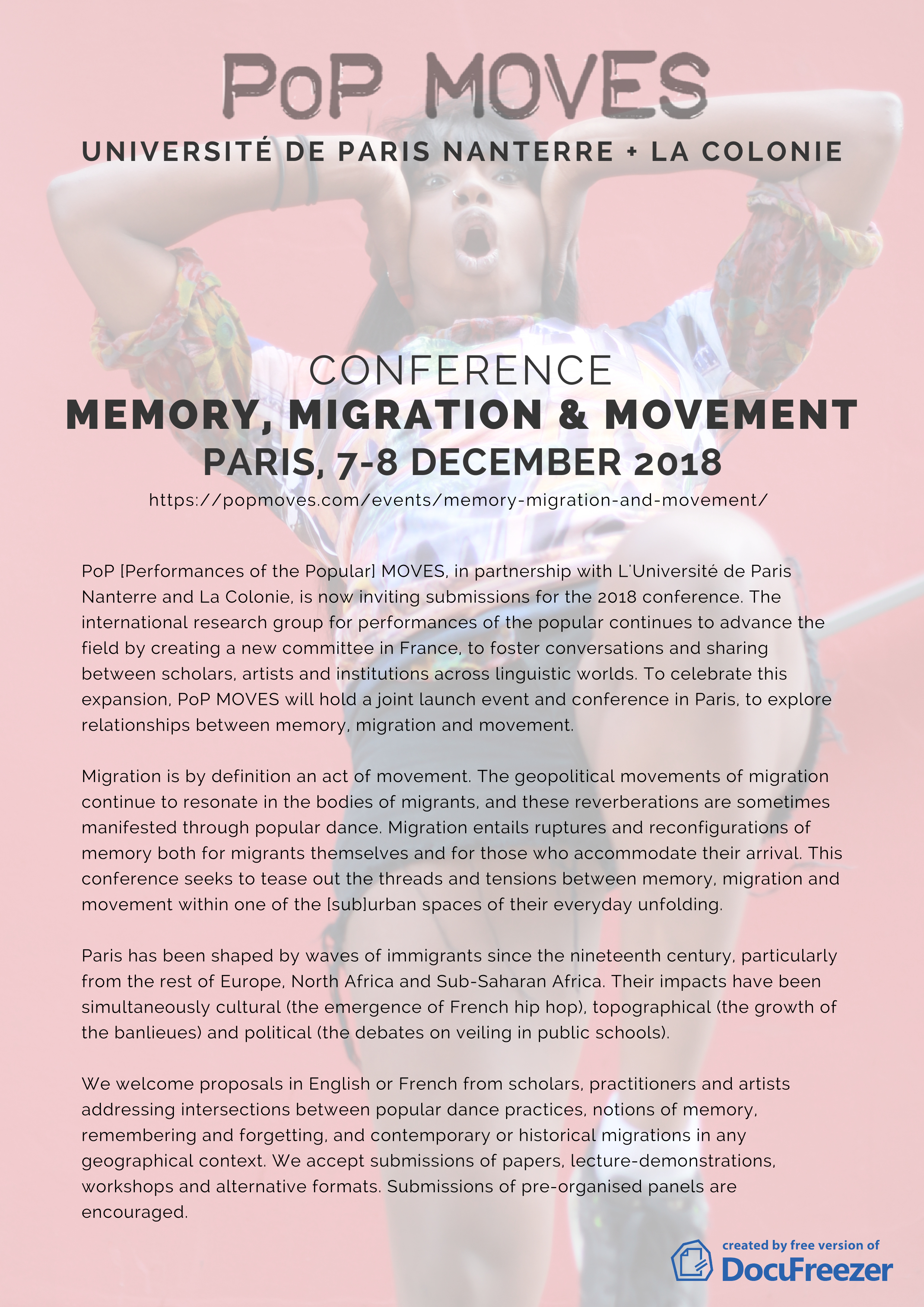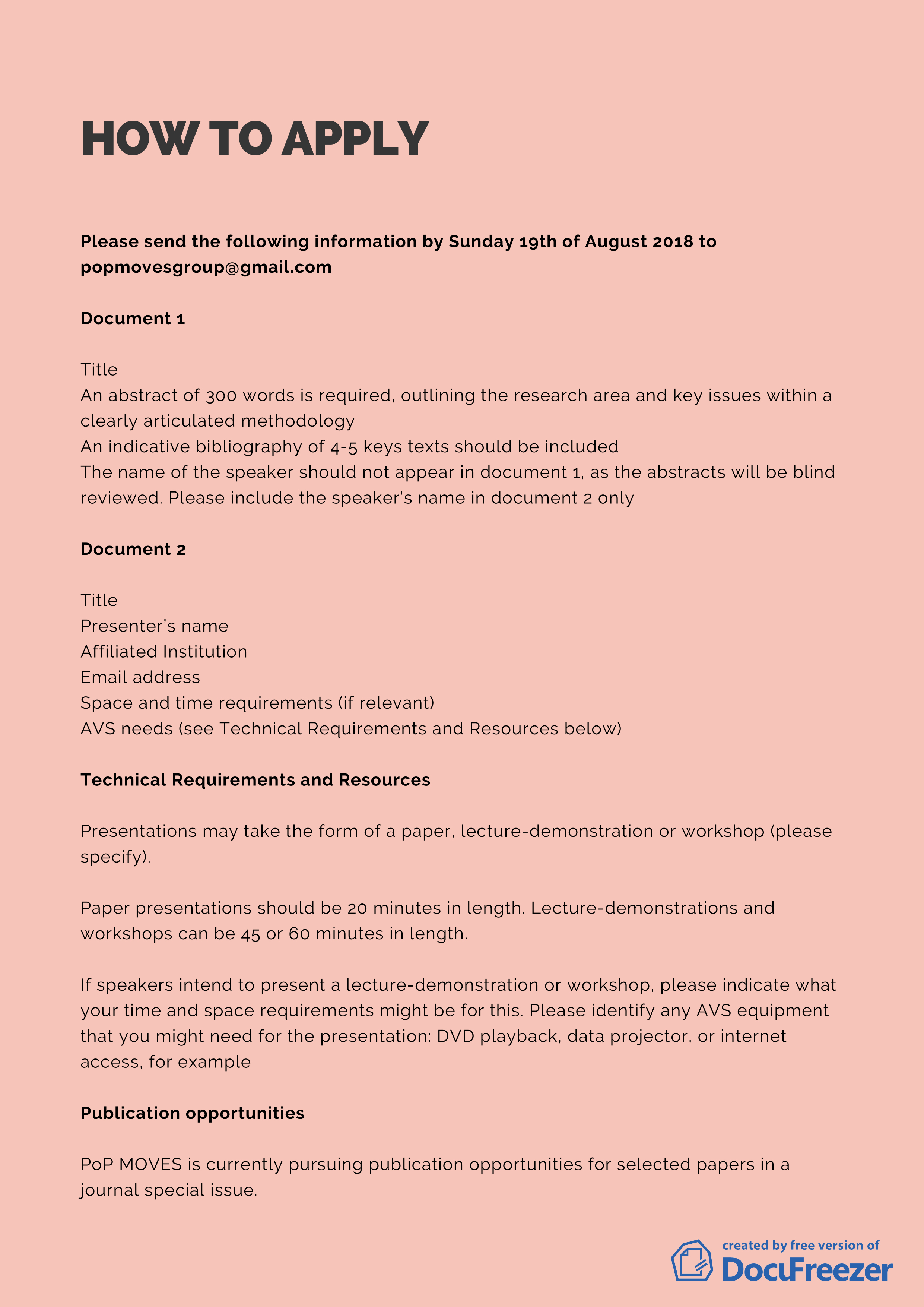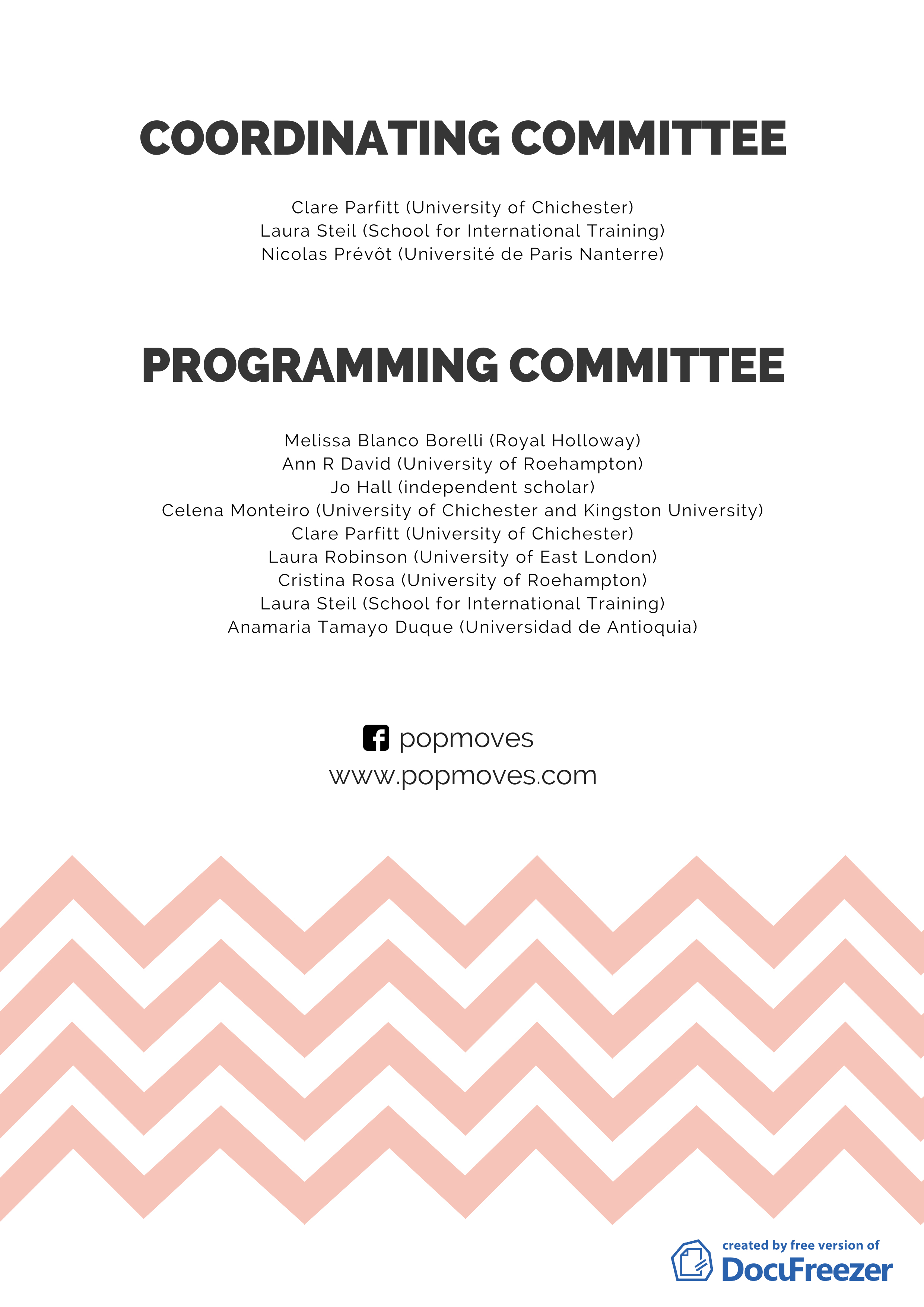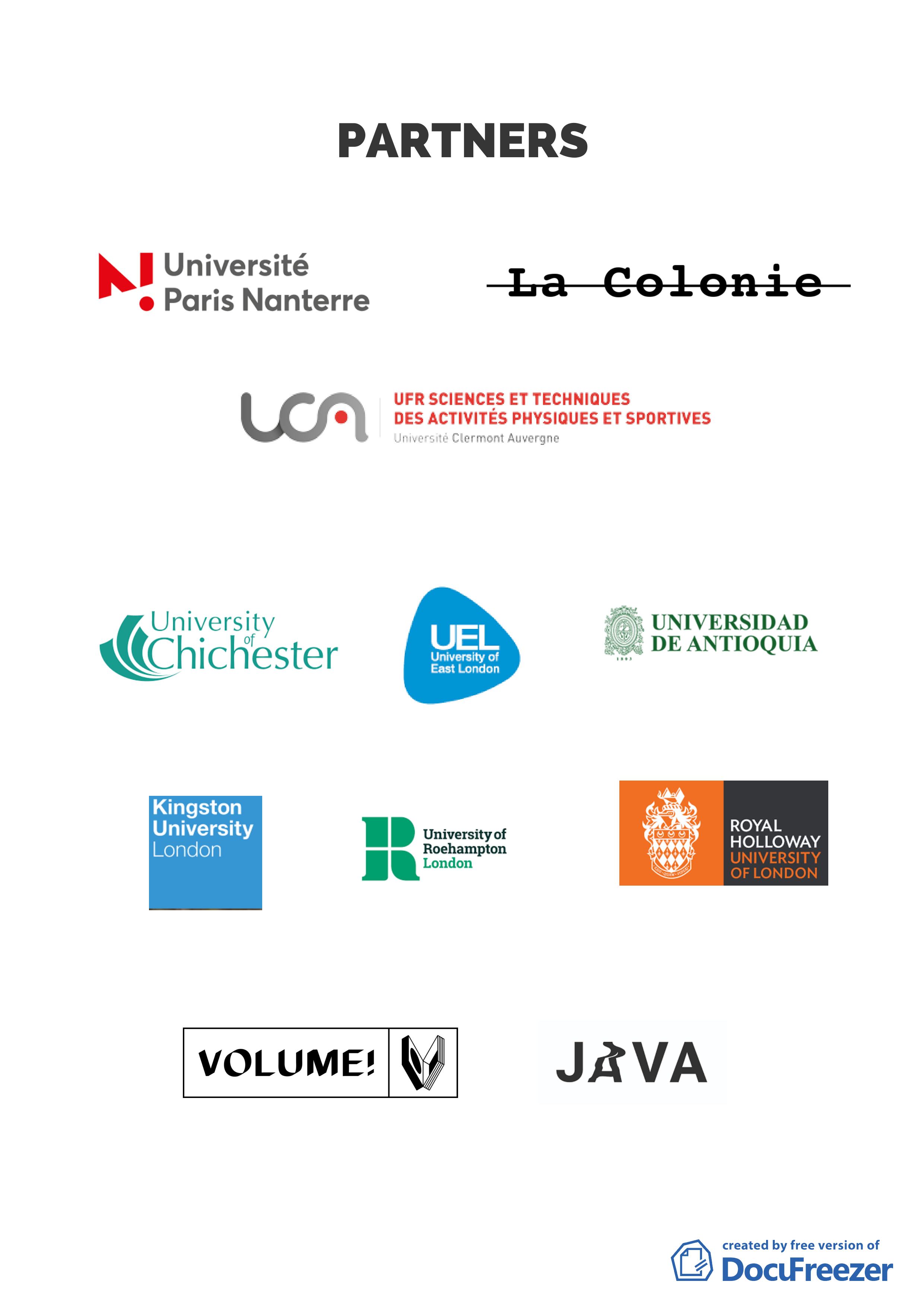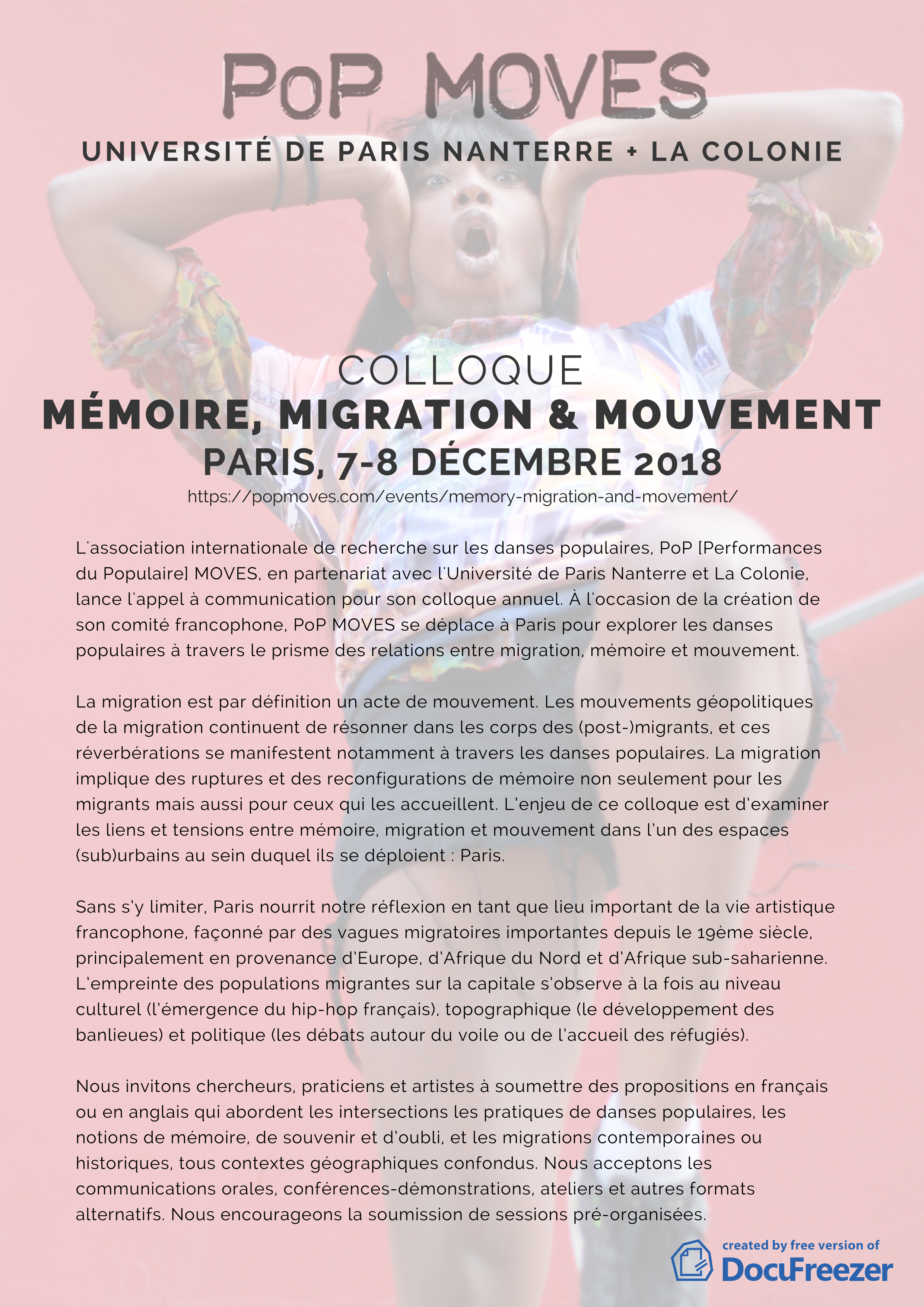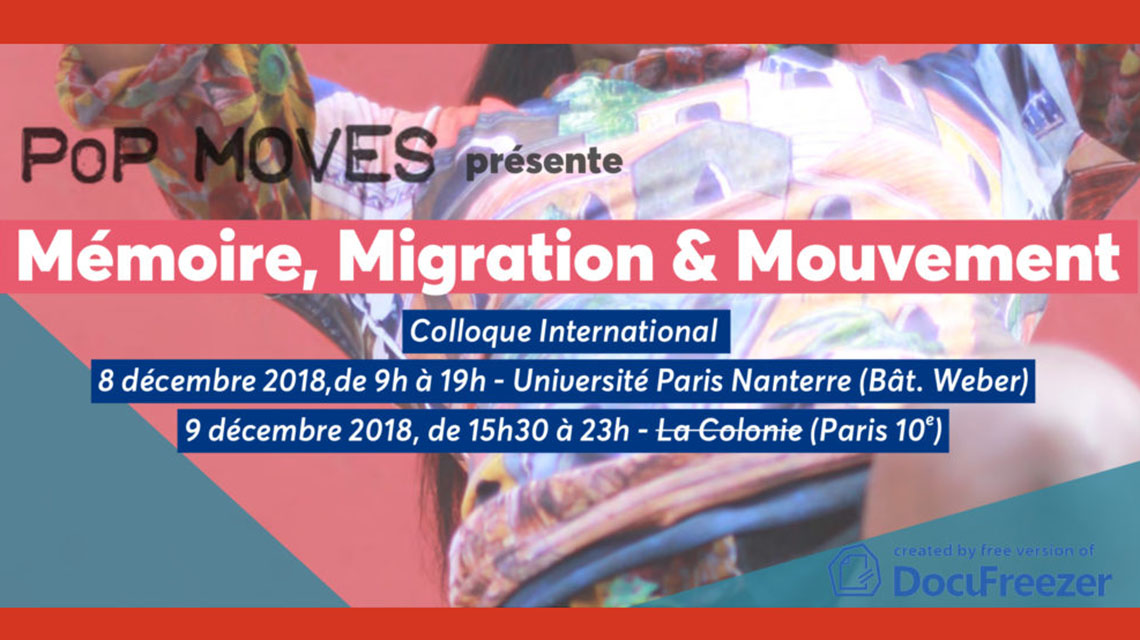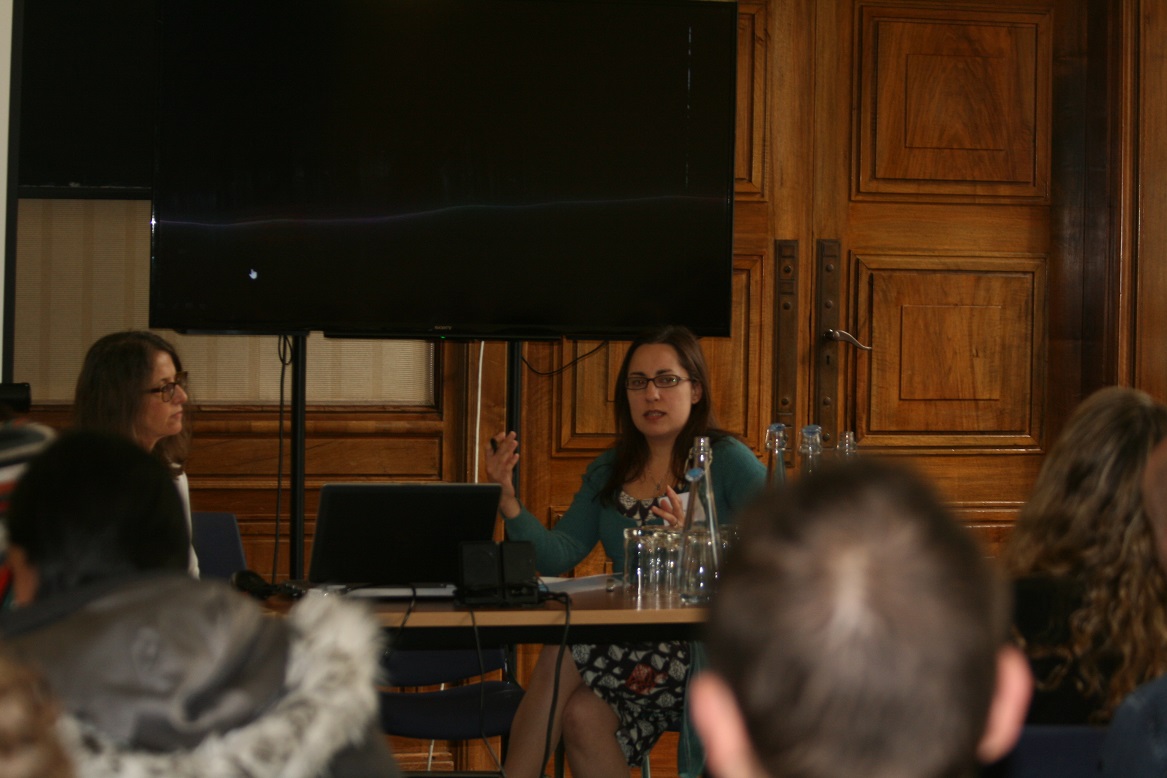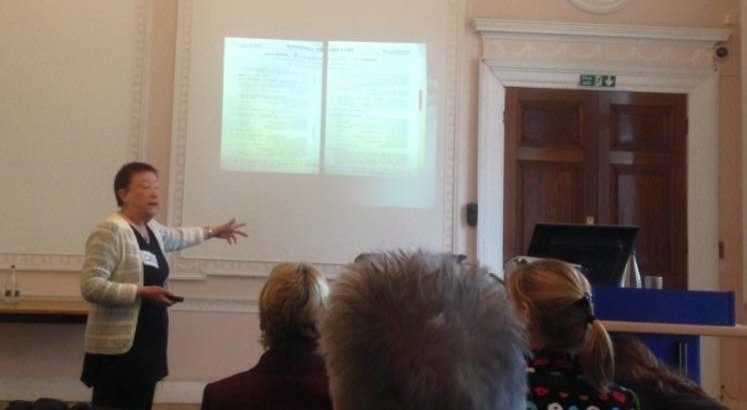Further information for delegates is listed on this page as follows:
Printable Schedule – with French introduction (PDF)
Printable Schedule – with English introduction (PDF)
Abstracts
Outline Timetable
Provisional Schedule
Conference Venues
Hotels
Call for Papers (now closed)
Addressing (Im)mobilities sub-call (now closed)
Outline Timetable
Provisional Schedule/Programme prévisionel
SATURDAY 8th DECEMBER/SAMEDI 8 DÉCEMBRE
Université de Paris Nanterre
8.30-9.00: Registration/Acceuil
Lobby of Max Weber building
Throughout the day/Toute la journée
IPod/Poster installation in Lobby
‘Exploring colonial sounds: Developing counter-representations of the Afro-Ecuadorian music genres, dances and instruments of Marimba Esmeraldeña and Bomba del Chota’ – María Gabriela López Yánez
9.00-9.15
Welcome Address/Mot de Bienvenue
Amphithéâtre (Max Weber)
Laura Steil (School for International Training) and Clare Parfitt (University of Chichester)
9.15-10.45
Panel 1: Screens and (re)mediations/Écrans et (re)médiations
Room: Amphithéâtre (Max Weber)
Chair: Celena Monteiro (Kingston University)
- ‘Networked Shôjo (girls) and the migration of gesture: (The danger of) cute girl imitation, assimilation, and reproduction through corporeal/media convergence’ – Katherine Mezur (University of California, Berkeley) (20min)
- ‘Dis/orienting place, space and spectatorship: Parris Goebel’s Polyswagg and the politics of YouTube encounters’ – Elena Benthaus (University of Melbourne) (20min)
- ‘Remembering and forgetting:Smooth Criminal‘s cultural histories, global circulations, and counter-memories’ – Elizabeth June Bergman (Temple University) (20min)
Panel 2: Sustaining resistance/Résistances durables
Room: Salle de séminaire 2 (Max Weber)
Chair: Nathalie Montlouis Despois (Éducation Nationale)
- ‘Movements of sustainability: A look at capoeira Angola as a practice of cultural resistance anchored on movement, memory and migration’ – Cristina Rosa (University of Roehampton) (20 min)
- ‘Exister et résister : danser avec les bboys et bgirls à Mayotte’ – Pierre-Henri Daculsi (Université Paris, Nanterre) (20min)
- ‘Danses paysannes pérégrinantes en Europe au Moyen Âge tardif : Migration mémorielle d’une condition humaine?’ – Panayota Volti (Université Paris, Nanterre) (20min)
Panel 3: Sounds in motion/Sons en mouvement
Room: Salle S3 (Milliat)
Chair: Giordano Marmone (University de Paris Nanterre, CREM)
- Être salseroen Afrique de l’Ouest: Entre appropriation locale, circulations transnationales et afropolitanisme – Elina Djebbari (Université Sorbonne Nouvelle, Paris 3) (20 min)
- ‘Samba migrations: From Brazil to Australia’ (video presentation) – Lilian Jean Shaddick (University of Sydney) (20min)
10.45-11.00: Break
11.00-12.30
Panel 4: Re-screening memory/Re-diffuser la mémoire
Room: Amphithéâtre (Max Weber)
Chair: Elizabeth June Bergman (Temple University)
- ‘Dancing the traumatic past away: The performativity of dance for survivors of the Holocaust and their descendants’ – Diana Popescu (Birkbeck, University of London) (20min)
- ‘Re-constucting, re-creating, re-imagining: Exploring the use of popular dance films as a site for dance and disability interventions’ – Kathryn Stamp (Coventry University) (20min)
- ‘The way back? France/Algeria, virile territory, and masculinities in motion’ – Megan C. MacDonald (University of Aix-Marseille/University of Istanbul) (20 min)
Panel 5: Transnational mobilities/Mobilités transnationales
Room: Salle S3 (Milliat)
Chair: Marie-Pierre Gibert (Université Lumière Lyon 2)
- ‘Russians rumba-ing in Reno? The lived experience of foreign ballroom dancers in the US ballroom dance industry’ – Roger Wiblin (Brigham Young University) (20 min)
- ‘Remembering and reflecting on movement migrations between London, Paris and Martinique: The case of two Zil’Oka dancers’ (curated conversation) – Celena Monteiro (Kingston University, London) and Dr. Nathalie Montlouis Despois (Independent scholar) (more than 20 min?)
- ‘Dancing to change the world’ – Ray Batchelor (The Queer Tango Project) (20 min)
Film, followed by an Interactive Lecture Demonstration / film et conference dansée interactive
Room: Salle de séminaire 2 (Max Weber)
Chair: Georgiana Wierre Gore (Université de Clermont Auberge)
- Des Couleurs et des Voix, Souvenirs Colorés du Bâtiment F, documentary (26 minutes) Florence Cosfenoy, 2016. French with English subtitles.
‘Des couleurs et des voix, vingt-cinq portes du bâtiment F’ (‘Colours and voices, twenty-five doors of building F’) is a short film (26’) capturing the memories of 25 displaced residents of a soon-to-be demolished social housing estate in Nanterre. Built in place of shantytowns in the 1960s, the estate mostly housed families of immigrant origin, especially of North Africa. Florence Cosnefroy, a mixed-media and visual artist, asked residents to represent their memories by one colour and created an 11-floor long poster which got pasted on the vacated building before its demolition. While her film approaches displacement from a sensorial, affective and embodied perspective, residents are visually absent from the film, their voices being instead projected onto the materiality of the building. Her work, immersive and participatory, challenges viewers-as-participants to reflect on positionality, voice and embodiment.
- ‘Interdepen(dance)’ – Sylvia Grove (Susquehanna University) and Jen Boum Maké (University of Pittsburgh) (interactive lecture / demonstration) (60 min)
12.30-1.30: Lunch
1.30-3.00
Panel 6: Gendering migrant movements/Mouvements migrants genrés
Room: Amphithéâtre (Max Weber)
Chair: Betty Lefevre (Université de Rouen, aCD)
- ‘Divine diamonds: Embodiment and movement in the Frenchbanlieue‘ – Margaret C. Flinn (Ohio State University) (20min)
- ‘Fluid recollections: (Re)presentations of the double-bind inPour que les larmes de nos meres deviennent une légende‘ – Keziah Berelson (University of Leeds) (20min)
- ‘Dancing reggaeton: Expressing, challenging and reinforcing cultural identities’ – Alexandra Quinn (University of Roehampton/Independent Scholar) (20min)
Panel 7: Moving beyond conflict/Bouger au-delà du conflit
Room: Salle de séminaire 2 (Max Weber)
Chair: Elizabeth Claire (CRNS, Centre de Recherches Historiques)
- ‘Bouger beaucoup, bouger pas trop. Variantes et tendances de la danse kizomba entre l’Angola (Luanda) et l’Europe’ – Federica Toldo (Université Paris, Nanterre) (20min)
- ‘Choreographed bodies: Returnee recollection, dance, and memorialization in post (1994)-genocide Rwanda’ – Kate Temoney (Montclair State University) (20min)
- Migrating Bodies/Moving Borders – Elisabetta Bisaro (La Briqueterie) (20 min)
3.00-3.15: Break
3.15-4.30
Video performance and video presentation/Performance et presentation vidéo
Room: Amphithéâtre (Max Weber)
Chair: Laure Carbonnel (Université de Paris Nanterre, IHA-CREPOS)
- ‘The moving cloth of Angélique Kidjo’ (video performance and video presentation) – Rashida K. Braggs (Williams College) (45 min)
Interactive Lecture Demonstration/Conférence dansée
Room: Salle de séminaire 2 (Max Weber)
Chair: Cristina Rosa (Roehampton University)
- ‘Shapeshifters: Self-organizing systems, migration and repetition at the intersection of folk and popular dance’ (interactive lecture demonstration) – Ruth Pethybridge (Falmouth University), Jo Parkes (Mobile Dance e.V), Jane Turner (London Metropolitan University) (60 min)
4.45-5.30: Plenary/Plénière (Arènes de Nanterre)
Marie-Pierre Gibert
Georgiana Wierre-Gore
Elizabeth Claire
Celena Monteiro
Cristina Rosa
Elena Benthaus
Ray Batchelor
Roger Wiblin
Clare Parfitt (chair)
5.30-6.30: Francophone Node Launch/Lancement de l’Antenne Francophone (Arènes de Nanterre)
7.00-9.00: Conference Dinner/Diner du Colloque (location in Nanterre to be confirmed)
SUNDAY 9th DECEMBER/DIMANCHE 9 DÉCEMBRE
La Colonie
3.00-5.00
Curated conversations/Conversations modérées
Étudier les danses populaires, la mémoire et la migration
Facilitators/modératrices: Laura Steil (School for International Training) and Sisa Calapi (Université de Paris Nanterre)
These curated conversations, especially designed for students (including self-training dance students), are organized around a series of questions related to the theme of the conference. Participants are split up into small groups (4-5 participants). Each group works on a specific question, chosen among/adapted from a list of suggested questions. People bring their different experiences, perspectives, and research experiences to the table. Groups are then reorganized to bring together individuals who have all worked on a different question. Each participant shares with his new group the main take-aways from the previous conversation. A new conversation emerges from this sharing and gives rise to the creation of a collective “mental map”—paper, pens, sharpies will be provided. A last moment is dedicated to a discussion of the whole group, where participants can think together of lingering questions and/or perspectives that they want to continue reflecting on, and may bring to the round table with popular dancers which follows right after.
Ces conversations, conçues spécialement pour les étudiants (y compris les danseurs se formant en autodictates), sont organisées autour d’une série de questions en lien avec la thématique du colloque PoP Moves 2018 : mémoire, migration et mouvement. Il y a d’abord deux temps de conversation en petits groupes. Dans un premier temps, chaque groupe travaille sur une question spécifique, choisie parmi/retravaillée à partir des questions proposées. Après, les groupes sont défaits et réorganisés de manière à rassembler des individus ayant tous travaillé sur une question différente. Chacun rapporte à son nouveau groupe les points principaux tirés de la conversation précédente. Une nouvelle conversation émerge de ce partage et donne lieu à la confection d’une « carte mentale » collective—papiers, stylos et feutres serons fournis. Un dernier moment est consacré à une conversation de tout le groupe, où les participants peuvent partager leurs perspectives ou les questions qui demeurent, qu’ils pourront mobiliser dans la table ronde qui juste suit après.
5.00-7.00
Table ronde : Perspectives croisées de danseurs populaires sur la mémoire, la migration et le mouvement
Chair: Laura Steil (School for International Training)
Speakers/Invités: Afouz “Regulate” Olongo (Melting Crew), Anaïs Imbert-Clery (Paradox’sal), Clark Donovan (Paradiz Music), Fabrice “Pika” Taraud (Black History Month, les Gens De, FBL), Jin Kash, Michel “Meech” Onomo (Ghost Flow, Too High Spirit), Nadia “Nadeeya” Gabrieli Kalati (Paradox’sal, Dipita Moovement), Raïssa Leï (KifKifBledi), Youri Comuce.
7.00-9.00
DJ Set: DJ Prophet
Conference Venues
The conference will be held in venues with significance in the histories of popular culture and protest in Paris. Further information on these histories can be found in English and French here
8 December, 9am-5pm
Access :
R.E.R. : RER A (Nanterre Université)
Train : Ligne L (Nanterre Université)
Bus : 259, 304, 367, 378 (Nanterre Université)
Université de Paris-Nanterre
200 avenue de la République,
92001 Nanterre Cedex
+33 1 40 97 72 00
www.parisnanterre.fr
You can download a campus map here
Batiment Max Weber
https://www.parisnanterre.fr/presentation/memoires-des-lieux-max-weber-800663.kjsp
Batiment Milliat
https://www.parisnanterre.fr/presentation/memoires-des-lieux-alice-milliat-800661.kjsp
Arènes de Nanterre
220 Avenue de la République, 92000 Nanterre
www.les-noctambules.com/fr/accueil.html
9 December, from 3.30pm
Access :
Metro : Lines 2, 4, 5, 7 (Gare du Nord)
RER: B, D, E (Gare du Nord)
Bus: 26, 32, 38, 39, 42, 43, 46,48
La Colonie128 Rue la Fayette, 75010 Paris France
+33 1 45 81 03 05
http://www.lacolonie.paris/
Hotels near the conference venue
B&B Hotel Campanile Paris Ouest – Nanterre – La Défense
20-22 Avenue Pablo Picasso, 92000 Nanterre France
+33 1 47 29 15 51
nanterre@campanile.fr
Starting from 59€/night
Hôtel L’Amandier Nanterre – La Défense
14 Avenue Pablo Picasso, 92000 Nanterre France
+33 1 47 29 10 77
http://www.hotelamandier.com/
Starting from 60€/night
Qualys Hôtel Nanterre
2, avenue Benoît Frachon, 92000 Nanterre France
+33 1 46 95 08 08
qn9211@qualys-hotel.com
http://hotel-ladefense-paris.com/
Starting from 60€/night
The Call for Papers has now closed. Below is a record of the Call for Papers for archival purposes.
Please scroll down for the French and Spanish versions of the Call for Papers.
Veuillez faire défiler vers le bas pour la version française de l’appel à communications.
Por favor vaya al final de la página para leer la versión en Español.
PDFs of the Call for Papers are available in French and English.
Les documents PDF de l’appel à communications sont disponibles en français et en anglais.
If you are unable to come to Paris in December, for any reason, but are still interested in participating in the conference, please see our sub-call, Addressing (Im)mobilities.
If you are an artist, our sub-call, Addressing (Im)mobilities, includes information on submitting audio/video proposals.
